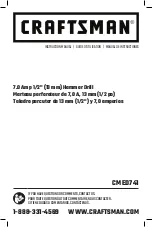
plugging in.
Carrying tools with your finger on the switch or
plugging in tools that have the switch on invites accidents.
•
Remove adjusting keys or switches before turning the tool on.
A wrench or key that is left attached to a rotating part of the tool may
result in personal injury.
•
Do not overreach. Keep proper footing and balance at all
times.
Proper footing and balance enables better control of the tool
in unexpected situations.
•
Use safety equipment. Always wear eye protection.
Dust mask,
non-skid safety shoes, hard hat, or hearing protection must be used
for appropriate conditions.
TOOL USE AND CARE
•
Use clamps or other practical way to secure and support the
workpiece to a stable platform.
Holding the work by hand or
against your body is unstable and may lead to loss of control.
•
Do not force tool. Use the correct tool for your application.
The
correct tool will do the job better and safer at the rate for which it is
designed.
•
Do not use tool if switch does not turn it on or off.
Any tool that
cannot be controlled with the switch is dangerous and must be
repaired.
•
Disconnect the plug from the power source before making any
adjustments, changing accessories, or storing the tool.
Such
preventative safety measures reduce the risk of starting the tool
accidentally.
•
Store idle tools out of reach of children and other untrained
persons.
Tools are dangerous in the hands of untrained users.
•
Maintain tools with care. Keep cutting tools sharp and clean.
Properly maintained tools, with sharp cutting edges are less likely to
bind and are easier to control.
•
Check for misalignment or binding of moving parts, breakage
of parts, and any other condition that may affect the tools
operation. If damaged, have the tool serviced before using.
Many accidents are caused by poorly maintained tools.
•
Use only accessories that are recommended by the
manufacturer for your model.
Accessories that may be suitable
for one tool, may become hazardous when used on another tool.
SERVICE
•
Tool service must be performed only by qualified repair
personnel.
Service or maintenance performed by unqualified
personnel could result in a risk of injury.
•
When servicing a tool, use only identical replacement parts.
Follow instructions in the Maintenance section of this manual.
Use of unauthorized parts or failure to follow Maintenance
Instructions may create a risk of electric shock or injury.
Additional Safety Rules
•
Hold tool by insulated gripping surfaces when performing an
operation where the cutting tools may contact hidden wiring
or its own cord.
Contact with a “live” wire will make exposed metal
parts of the tool “live” and shock the operator.
•
Keep handles dry, clean, free from oil and grease.
It is
recommended to use rubber gloves. This will enable better control
•
DO NOT TOUCH ANY METAL PARTS OF THE TOOL when
drilling or driving into walls, floors or wherever live electrical
wires may be encountered.
Hold the tool only by insulated
grasping surfaces to prevent electric shock if you drill or drive into a
live wire.
CAUTION:
Wear appropriate personal hearing protection during
use. Under some conditions and duration of use, noise from this
product may contribute to hearing loss.
WARNING:
Some dust created by power sanding, sawing, grinding,
drilling, and other construction activities contains chemicals known to
cause cancer, birth defects or other reproductive harm. Some
examples of these chemicals are:
• lead from lead-based paints,
• crystalline silica from bricks and cement and other masonry
products, and
1
English
Snap-on Drill 11/12/03 8:47 AM Page 1






































